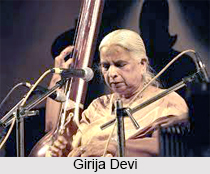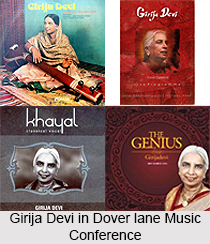 Girija Devi is a noted Indian classical vocalist belonging to the Banaras Gharana. For her expertise and contributions she has been regarded as the Queen of Thumri. However her proficiency encompasses both classical as well as light classical music.
Girija Devi is a noted Indian classical vocalist belonging to the Banaras Gharana. For her expertise and contributions she has been regarded as the Queen of Thumri. However her proficiency encompasses both classical as well as light classical music.
Girija Devi has also contributed significantly in enriching the Thumri genre of Indian classical music. She has graced numerous music concerts with her enchanting renditions. This illustrious classical vocalist has been honoured with many prestigious accolades.
Early Life of Girija Devi
Girija Devi was born on 8th May 1929 in Varanasi city of Uttar Pradesh. She received her initial training in music from her father, who also used to play the harmonium. Since the age of five Girija Devi received training for singing Tappa and Khayal from the famed vocalist and Sarangi player Sarju Prasad Misra. Subsequently she gained expertise in many other singing styles as well under the tutelage of Sri Chand Misra. At the age of nine she also starred in the film "Yaad Rahe".

Career of Girija Devi
Girija Devi rendered her first public performance in the year 1949 on All India Radio, Allahabad. At that time she was already married to a businessman since the year 1946. Her first performance however encountered much opposition on the part of her mother and grandmother as during that period traditional belief did not allow any upper class woman to perform publicly. However Girija Devi gave her first public concert in the year 1951 in Bihar. Later she continued her studies with Sri Chand Misra till the death of latter in the early 1960s. In 1980s she worked as a faculty member of the ITC Sangeet Research Academy in Kolkata. She also worked as a faculty member of Banaras Hindu University in the early 1990s during which she inspired and trained her students to preserve the musical heritage of India. Girija Devi toured extensively for rendering remarkable musical performances.
Singing Style of Girija Devi
The singing style of Girija Devi is of Banaras Gharana and she specializes in the Purabi Ang Thumri style which is typical of the tradition. She contributed greatly in elevating this genre of music. Her musical repertoire includes Tappa, Indian folk music, Khayal, Chaiti, Kajri and many more. As per the New Grove Dictionary of Music and Musicians her semi classical singing strongly reflects her classical training with influences of the songs of eastern Uttar Pradesh and Bihar. She has also provided training to Mrs. Mamta Bhargava who is the founder of Indian classical music school named the Alankar School of Music. The school owns a great repute and allures students from far off regions.
Awards Received by Girija Devi
Girija Devi has been honoured with the Padma Shri in the year 1972 while in 1989 she received the Padma Bhushan. In 1977 she was awarded with the Sangeet Natak Akademi Award and in 2010 she got the Sangeet Natak Akademi Fellowship. Apart from this, she has also received Tana Riri Puraskar, GiMA Awards (2012), Sangeet Samman Award (in Dover Lane Music Conference) and Maha Sangeet Samman Award (2012). In the year 2016, GirijaDevi was awarded Padma Vibhushan Award from the Government of India.
Death of Girija Devi
Girija Devi died on 24th October in the year of 2017.




















